|
|
|
Sort Order |
|
|
|
Items / Page
|
|
|
|
|
|
|
| Srl | Item |
| 1 |
ID:
080836
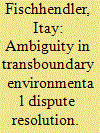

|
|
|
|
|
| Publication |
2008.
|
| Summary/Abstract |
Cooperation over transboundary environmental resources, water in particular, has been analyzed from various perspectives. Each study identifies the problems of cooperation differently and suggests different mechanisms to enhance it. Yet, the role of ambiguity, particularly significant in treaty design to resolve environmental disputes, has thus far been overlooked. Such a focus is warranted, since many international agreements regulating the use of natural resources are ambiguous in their schedule of resource delivery during crisis events or in their cost-sharing arrangements and may even include contradictory resource-allocation principles while remaining vague on how to settle the contradictions. This study aims to examine why, when, and how ambiguity is applied in agreements pertaining to natural resources, and water in particular. The Israeli-Jordanian peace agreement, which includes an annex on water-use regulation, is used as a case study. It was found that, under asymmetric power relations, when both sovereignty costs and uncertainty are high, several types of deliberate ambiguity were intentionally incorporated into the treaty. Some ambiguities allowed each side to present the treaty differently at home, thereby defusing domestic opposition, while others provided leeway to adjust the resource allocation during a future crisis without the need to renegotiate the treaty
|
|
|
|
|
|
|
|
|
|
|
|
|
|
|
|
| 2 |
ID:
178678


|
|
|
|
|
| Summary/Abstract |
This article examines how and when energy is used as a punitive or rewarding measure to advance foreign policy ends under conditions of perpetual conflict. Drawing on hundreds of primary governmental and commercial documents, and extensive elite interviews, we examine Israeli–Palestinian relations over 50 years. We find extensive instrumentalization of energy for foreign policy objectives in the conflict. We highlight electricity, a neglected area in international relations and conflict literatures, as a significant foreign policy tool. Our findings emphasize four major variables that shape the timing and form of energy measures—politics, regime type, dependence level, and energy production chain.
|
|
|
|
|
|
|
|
|
|
|
|
|
|
|
|
| 3 |
ID:
163502
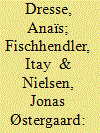

|
|
|
|
|
| Summary/Abstract |
Environmental peacebuilding represents a paradigm shift from a nexus of environmental scarcity to one of environmental peace. It rests on the assumption that the biophysical environment’s inherent characteristics can act as incentives for cooperation and peace, rather than violence and competition. Based on this, environmental peacebuilding presents cooperation as a win-win solution and escape from the zero-sum logic of conflict. However, there is a lack of coherent environmental peacebuilding framework and evidence corroborating the existence of this environment-peace nexus. Building on a multidisciplinary literature review, this article examines the evolution of environmental peacebuilding into an emerging framework. It unpacks the concept and explains its main building blocks (conditions, mechanisms and outcomes) to develop our understanding of when, how and why environmental cooperation can serve as a peacebuilding tool. It assembles these building blocks into three generic trajectories (technical, restorative and sustainable environmental peacebuilding), each characterised according to their own causality, drivers and prerequisites, and illustrated with concrete examples. Finally, this article draws attention to the remaining theoretical gaps in the environmental peacebuilding literature, and lays the foundations for an environmental peacebuilding research agenda that clarifies if and how environmental cooperation can spill over across borders, sectors and scales towards sustainable peace.
|
|
|
|
|
|
|
|
|
|
|
|
|
|
|
|
| 4 |
ID:
149880
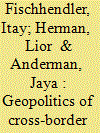

|
|
|
|
|
| Summary/Abstract |
Countries often attempt to establish regional electricity grids. However, whereas research on natural resources frequently seeks to understand policy outcome through a geopolitical prism, when it comes to electricity studies the prism is always economic or technical. Hence, this study is a first attempt to identify the geopolitical dimension of cross-border electricity grids. The study argues that success in establishing electricity grids requires identifying how the geopolitical dimension interplays with the physical dimension. To examine the role of these geopolitical bottlenecks, the study examines negotiation protocols, spanning over 15 years, on establishing ten grid connections between Israel and its Arab neighbors. It finds that electricity geopolitics has been used both as a platform for deeper international cooperation and as a stick against neighboring states. When policies are driven by a peace dividend, proposals for grid connection appear to evolve and overcome the dependency and the security-economy bottlenecks. When relations deteriorate, proposals for grid connections appear to undergo reconsideration and to be held hostage by higher politics. If, when and how electricity grids materialize is a function of the nature of the electricity network as a twofold package and of the ability of the planning process to accommodate geopolitical uncertainty.
|
|
|
|
|
|
|
|
|
|
|
|
|
|
|
|
| 5 |
ID:
132766
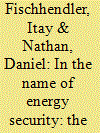

|
|
|
|
|
| Publication |
2014.
|
| Summary/Abstract |
The aim of this study is to place the notion of energy security under critical scrutiny by unpacking how different actors manipulate the term through the mobilization of existential language as a prism for creating securitization discourse. Through an examination of an Israeli inter-ministerial committee charged with developing national policy regarding newly-discovered natural gas reserves off the coast of Israel, the study finds that the concept of energy security is open for manipulation and various interpretations. While some actors stress environmental acceptability and independency as pillars of energy security, others prioritized supply reliability and geopolitical benefits associated with gas exportation. Each definition of energy security was also found to be anchored in different ideologies, goals, policies and legitimizing factors. The coupling of energy with securitization rhetoric was ultimately determined as working against cooperative efforts, as committee conflicts intensified and suggested institutional measures became disproportional.
|
|
|
|
|
|
|
|
|
|
|
|
|
|
|
|
| 6 |
ID:
132765
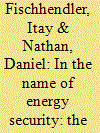

|
|
|
|
|
| Summary/Abstract |
The aim of this study is to place the notion of energy security under critical scrutiny by unpacking how different actors manipulate the term through the mobilization of existential language as a prism for creating securitization discourse. Through an examination of an Israeli inter-ministerial committee charged with developing national policy regarding newly-discovered natural gas reserves off the coast of Israel, the study finds that the concept of energy security is open for manipulation and various interpretations. While some actors stress environmental acceptability and independency as pillars of energy security, others prioritized supply reliability and geopolitical benefits associated with gas exportation. Each definition of energy security was also found to be anchored in different ideologies, goals, policies and legitimizing factors. The coupling of energy with securitization rhetoric was ultimately determined as working against cooperative efforts, as committee conflicts intensified and suggested institutional measures became disproportional.
|
|
|
|
|
|
|
|
|
|
|
|
|
|
|
|
| 7 |
ID:
163805
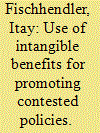

|
|
|
|
|
| Summary/Abstract |
The evaluation of many contested projects and policies often includes intangible benefits. Geopolitics represents one type of intangible benefit. Despite a few examples on the use of geopolitics to promote contested projects, there is a gap in the literature on how geopolitical argumentation is constructed for the purpose of promoting resource-based policies. Hence, the aim of this study is to use an Israeli case study to examine how geopolitical constructs are used to promote competing energy policies concerning recent gas discoveries and to provide rudimentary insights on the implications for policy making. It was found that the geopolitical rationale was an appealing rhetorical device for all players as it is both unquantifiable and hence difficult to disprove and is rooted in the Israeli societal context. As a result, coalitions built their own geopolitical rationales, each with its own rhetorical tools. These literary tools were often embedded in narratives of power and geographical language with emotional resonance. Yet, the Israeli case demonstrates that geopolitical constructs come at a detrimental price as they promote censorship and exclusion of the public from the process.
|
|
|
|
|
|
|
|
|
|
|
|
|
|
|
|
|
|
|
|
|